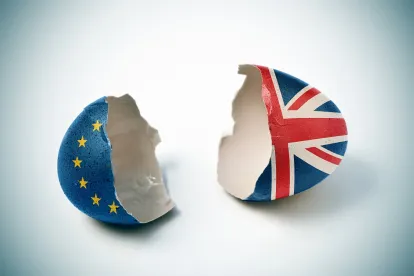UK Prime Minister Boris Johnson recently secured amendments to the draft Withdrawal Agreement to govern the UK’s exit from the European Union (i.e., ‘Brexit’) and the accompanying draft Political Declaration on the UK/EU future relationship.
The Withdrawal Agreement is the proposed treaty to govern the terms of the UK’s exit from the EU, while the Political Declaration, which will be non-binding, sets out the framework for the negotiations on the future relationship between the EU and the UK post-Brexit.
While neither the amended Withdrawal Agreement nor the amended Political Declaration has yet been approved by the UK Parliament (nor has either been formally approved by the necessary EU institutions), there are indications that there may be a majority in favour of both amongst UK parliamentarians who have previously – on three occasions – rejected the previous Withdrawal Agreement negotiated by Mr Johnson’s predecessor, Theresa May.
The Brexit situation remains very fluid – at the time of writing the EU has just agreed (but has not yet formally approved) an extension of the UK’s exit date, from 31 October 2019 to 31 January 2020, with an option for the UK to leave earlier if the Withdrawal Agreement is ratified. A UK general election could take place before then – but it is worth considering the potential implications of the amended Withdrawal Agreement and Political Declaration on UK environmental standards should both eventually be approved by the UK and the EU.
An important difference between Mr Johnson's Withdrawal Agreement and Mrs May's Withdrawal Agreement is that provisions relating to environmental protections have been removed and are now to be found in the amended Political Declaration. While the Withdrawal Agreement, once ratified, would be a legally binding treaty between the UK and the EU, the Political Declaration would be, as noted above, non-binding, at least under international law. Therefore, under Mr Johnson's proposal, the provisions relating to environmental standards would not be binding on the UK.
There are also substantive differences in the environmental provisions. There is no longer a commitment by the UK and EU to build on the environmental standards guaranteed in Mrs May’s Withdrawal Agreement (i.e., the so-called ‘level playing field’ arrangements) and instead, the UK and the EU commit to upholding the environmental standards applicable at the end of the period in which the UK will be required to follow EU rules post-Brexit (which would, under current proposals, end on 31 December 2020).
Therefore, and rather than the ‘dynamic alignment’ approach in Mrs May’s Withdrawal Agreement (i.e., with the UK effectively matching the EU’s environmental standards), the new proposed approach is one of ‘non-regression’ (i.e., the UK will not lower its environmental standards, but it will not be required to sign up to future environmental standards adopted by the EU). This suggests that the UK’s future relationship with the EU will be much looser than what was previously contemplated – a free trade agreement as opposed to a full customs union, and relatively free access to the EU’s single market.
While the Political Declaration is technically non-binding, the proposed UK legislation to implement the Withdrawal Agreement – which is currently stalled in the UK parliament – requires that the terms of the UK/EU future relationship be consistent with the Political Declaration. Therefore, while non-binding between the UK and the EU under international law, the Political Declaration would be binding on the UK under UK law (although there would be nothing to stop a future UK government from amending this, assuming it has a sufficient majority in parliament to do so).
The UK’s new approach is significant since it potentially creates a situation whereby the UK could seek to diverge from EU environmental standards – subject to the non-regression requirement – as a way of obtaining a competitive advantage over the EU as a place to do business. Indeed, recent news reports suggest that the UK is open to ‘significant divergence’ (FT link requires registration) from the EU post-Brexit. Environmental protection is a significant focus of EU regulatory development, and both the EU and the heads of state of EU member states have expressed concern that future lower standards in the UK vis-à-vis the EU would give UK-based business a competitive advantage or could create pressure in the EU for it to lower its standards. Environmental protection is also an area where the UK has found itself – even while it is a full member of the EU – before the European Court of Justice.
Of course, the UK’s level of access to the EU market post-Brexit will be conditional on the environmental standards adopted by the UK, since many of those standards go beyond regulating activities solely undertaken in the UK, and could extend to, for example, the substances allowed in products and the treatment of foodstuffs for export to the EU. The EU will be unwilling to allow its consumers to be exposed to UK products and foodstuffs where there is any risk resulting from a laxation in UK standards.
The post-Brexit extraterritorial effects of the EU’s various environmental regimes – the EU, along with the United States, is often described as a ‘regulatory superpower’ – on the UK are therefore likely to be significant, irrespective of whether or not the UK is formally obliged to follow or directly participate in them. It is open to question whether the UK would be willing to risk materially curtailing access to the EU market – the UK’s single biggest export market and likely to remain so for many years post-Brexit – by lowering its environmental standards to obtain a competitive advantage or to secure trade deals with non-EU countries (although the UK is likely to be under pressure to do so).
Further, the UK government has faced a backlash from representatives of key industries – aerospace, automotive, chemicals, food and drink, and pharmaceuticals – who, in a joint letter, stated it ‘is important [that] regulatory alignment should continue after Brexit as a critical element of the UK’s future relationship with the EU’. Many businesses in the UK are heavily invested in the various EU regulatory regimes and, while such regimes can undoubtedly be onerous and can impose significant costs, they are ‘known quantities’, and compliance with them is already standard practice.
Given the continued uncertainty around Brexit, businesses should continue to closely monitor developments and seek to identify how they, or their UK- and EU-based operations, may be impacted by changing circumstances.



 />i
/>i

